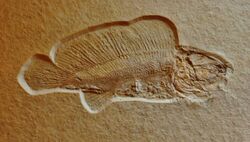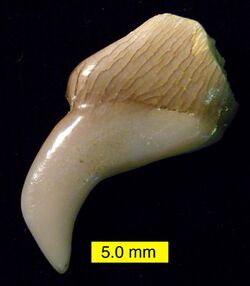Biology:Semionotiformes
| Semionotiformes | |
|---|---|

| |
| Fossil specimen of Macrosemimimus fegerti | |

| |
| Fossil of Macrosemius | |
| Scientific classification | |
| Domain: | Eukaryota |
| Kingdom: | Animalia |
| Phylum: | Chordata |
| Class: | Actinopterygii |
| Clade: | Ginglymodi |
| Clade: | Neoginglymodi |
| Order: | †Semionotiformes Arambourg & Bertini 1958 sensu López-Arbarello 2012 |
| Type genus | |
| †Semionotus Agassiz, 1843
| |
| Families | |
| |
| Synonyms | |
|
Macrosemiiformes Grande & Bemis 1998 | |
Semionotiformes is an order of ray-finned fish known from the Middle Triassic (Anisian)[1] to the Late Cretaceous (Maastrichtian).[2] Their closest living relatives are gars (Lepisosteidae), with both groups belonging to the clade Ginglymodi within the Holostei.[1] The group includes both freshwater (Semionotidae) and marine (Callipurbeckiidae, Macrosemiidae) adapted forms.[3] Many members of the family Macrosemiidae (which are usually included in Semionotiformes but sometimes placed in their own order), had elongated dorsal fins, often associated with an adjacent area of skin which was free of scales. These fins were likely undulated for use in precision swimming. The body morphology of macrosemiids suggests that they were slow swimmers that were capable of maneuvering around complex topography, such as reef environments.[4]
Classification
- Order †Semionotiformes Arambourg & Bertin 1958 sensu López-Arbarello 2012[5][6][7][8]
- Genus ?†Orthurus Kner 1866
- Genus †Sangiorgioichthys Tintori & Lombardo 2007
- Genus †Luoxiongichthys Wen et al. 2011
- Genus †Aphanepygus Bassani 1879
- Genus †Placidichthys Brito 2000
- Family †Pleurolepididae Lütken 1871
- Genus †Pleurolepis Agassiz 1863 non Quenstedt 1852
- Family †Macrosemiidae Wagner 1860a corrig. Cope 1889 sensu Murray & Wilson 2009 [Macrosemii Wagner 1860a]
- Genus †Eusemius Vetter 1881
- Genus †Blenniomoeus Costa 1850 [Calignathus Costa 1853]
- Genus †Enchelyolepis Woodward 1918
- Genus †Palaeomacrosemius Ebert, Lane & Kolbl-Ebert 2016
- Genus †Voelklichthys Arratia & Schultze 2012
- Genus †Notagogus Agassiz 1833-1844 [Neonotagogus Bravi 1994]
- Genus †Agoultichthys Murray & Wilson 2009
- Genus †Histionotus Egerton 1854
- Genus †Propterus Agassiz 1833-1844 [Rhynchoncodes Costa 1850]
- Genus †Macrosemiocotzus González-Rodríguez, Applegate & Espinosa-Arrubarrena 2004
- Genus †Legnonotus Egerton 1853
- Genus †Macrosemius Agassiz 1833-1844
- Family †Semionotidae Woodward 1890 sensu López-Arbarello 2012
- Genus †Semionotus Agassiz 1832 (Usually considered a wastebasket taxon)[3]
- Genus †Sargodon Plieninger 1847
- Family †Callipurbeckiidae López-Arbarello 2012 [Paralepidotidae Hadding 1919 ex Lund 1920]
- Genus †Occitanichthys López-Arbarello & Wencker 2016
- Genus †Semiolepis Lombardo & Tintori 2008
- Genus †Paralepidotus Stolley 1919
- Genus †Macrosemimimus Schröder, López-Arbarello & Ebert 2012
- Genus †Tlayuamichin López-Arbarello & Alvarado-Ortega 2011
- Genus †Callipurbeckia López-Arbarello 2012
Timeline of genera

<timeline> ImageSize = width:1500px height:auto barincrement:15px PlotArea = left:10px bottom:50px top:10px right:10px
Period = from:-299 till:15 TimeAxis = orientation:horizontal ScaleMajor = unit:year increment:25 start:-299 ScaleMinor = unit:year increment:5 start:-299 TimeAxis = orientation:hor AlignBars = justify
Colors =
#legends id:CAR value:claret id:ANK value:rgb(0.4,0.3,0.196) id:HER value:teal id:HAD value:green id:OMN value:blue id:black value:black id:white value:white id:paleozoic value:rgb(0.6,0.75,0.55) id:cambrian value:rgb(0.49,0.63,0.33) id:ordovician value:rgb(0,0.57,0.44) id:silurian value:rgb(0.70,0.88,0.71) id:devonian value:rgb(0.8,0.55,0.22) id:carboniferous value:rgb(0.4,0.65,0.6) id:permian value:rgb(0.94,0.25,0.24) id:mesozoic value:rgb(0.38,0.77,0.79) id:triassic value:rgb(0.51,0.17,0.57) id:jurassic value:rgb(0.2,0.7,0.79) id:cretaceous value:rgb(0.5,0.78,0.31) id:cenozoic value:rgb(0.95,0.98,0.11) id:paleogene value:rgb(0.99,0.6,0.32) id:neogene value:rgb(0.999999,0.9,0.1) id:quaternary value:rgb(0.98,0.98,0.50)
BarData=
bar:eratop bar:space bar:periodtop bar:space bar:NAM1 bar:NAM2 bar:NAM3 bar:NAM4 bar:NAM5 bar:NAM6 bar:NAM7 bar:NAM8 bar:NAM9 bar:NAM10 bar:NAM11 bar:NAM12 bar:NAM13 bar:NAM14 bar:NAM15 bar:NAM16 bar:NAM17 bar:NAM18 bar:NAM19 bar:NAM20 bar:NAM21 bar:NAM22 bar:NAM23 bar:NAM24 bar:NAM25 bar:NAM26 bar:NAM27 bar:NAM28 bar:NAM29 bar:NAM30 bar:NAM31 bar:NAM32 bar:NAM33
bar:space bar:period bar:space bar:era
PlotData=
align:center textcolor:black fontsize:M mark:(line,black) width:25 shift:(7,-4) bar:periodtop from: -299 till: -251 color:permian text:Permian from: -251 till: -199.6 color:triassic text:Triassic from: -199.6 till: -145.5 color:jurassic text:Jurassic from: -145.5 till: -65.5 color:cretaceous text:Cretaceous from: -65.5 till: -23.03 color:paleogene text:Paleogene from: -23.03 till: -2.588 color:neogene text:Neog. from: -2.588 till: 0 color:quaternary text:Q.
bar:eratop from: -299 till: -251 color:paleozoic text:Paleozoic Era from: -251 till: -65.5 color:mesozoic text:Mesozoic Era from: -65.5 till: 0 color:cenozoic text:Cenozoic
PlotData=
align:left fontsize:M mark:(line,white) width:5 anchor:till align:left
color:permian bar:NAM1 from:-260 till:-253.8 text:Acentrophorus color:permian bar:NAM2 from:-260 till:-199.8 text:Paralepidotus color:triassic bar:NAM3 from:-251 till:-245 text:Archaeolepidotus color:triassic bar:NAM4 from:-251 till:-245 text:Pericentrophus color:triassic bar:NAM5 from:-249.7 till:-237 text:Eosemionotus color:triassic bar:NAM6 from:-245 till:-175.6 text:Semionotus color:triassic bar:NAM7 from:-245 till:-228 text:Alleiolepis color:triassic bar:NAM8 from:-245 till:-228 text:Allelepidotus color:triassic bar:NAM9 from:-245 till:-228 text:Asialepidotus color:triassic bar:NAM10 from:-245 till:-228 text:Enigmatichthys color:triassic bar:NAM11 from:-245 till:-228 text:Sinosemionotus color:triassic bar:NAM12 from:-245 till:-199.6 text:Serrolepis color:triassic bar:NAM13 from:-228.7 till:-216.5 text:Aphelolepis color:triassic bar:NAM14 from:-228.7 till:-216.5 text:Orthurus color:triassic bar:NAM15 from:-228.7 till:-65.5 text:Lepidotus color:triassic bar:NAM16 from:-228.7 till:-203.6 text:Plesiolepidotus color:triassic bar:NAM17 from:-228 till:-199.6 text:Corunegenys color:triassic bar:NAM18 from:-228 till:-199.6 text:Hemicalypterus color:triassic bar:NAM19 from:-228 till:-199.6 text:Pristiosomus color:triassic bar:NAM20 from:-216.5 till:-203.6 text:Dandya color:triassic bar:NAM21 from:-216.5 till:-199.6 text:Sargodon color:triassic bar:NAM22 from:-216.5 till:-171.6 text:Dapedium color:triassic bar:NAM23 from:-203.6 till:-199.6 text:Prolepidotus color:jurassic bar:NAM24 from:-199.6 till:-145.5 text:Prionopleurus color:jurassic bar:NAM25 from:-183 till:-175.6 text:Austrolepidotus color:jurassic bar:NAM26 from:-183 till:-145.5 text:Tetragonolepis color:jurassic bar:NAM27 from:-164.7 till:-149.03 text:Heterostrophus color:jurassic bar:NAM28 from:-155.7 till:-150.8 text:Callopteus color:jurassic bar:NAM29 from:-155.7 till:-150.8 text:Oligopleurus color:cretaceous bar:NAM30 from:-112 till:-70.6 text:Paralepidosteus color:cretaceous bar:NAM31 from:-99.6 till:-93.5 text:Oshunia color:cretaceous bar:NAM32 from:-99.6 till:-93.5 text:Sphathiurus
PlotData=
align:center textcolor:black fontsize:M mark:(line,black) width:25 bar:period from: -299 till: -251 color:permian text:Permian from: -251 till: -199.6 color:triassic text:Triassic from: -199.6 till: -145.5 color:jurassic text:Jurassic from: -145.5 till: -65.5 color:cretaceous text:Cretaceous from: -65.5 till: -23.03 color:paleogene text:Paleogene from: -23.03 till: -2.588 color:neogene text:Neog. from: -2.588 till: 0 color:quaternary text:Q.
bar:era from: -299 till: -251 color:paleozoic text:Paleozoic Era from: -251 till: -65.5 color:mesozoic text:Mesozoic Era from: -65.5 till: 0 color:cenozoic text:Cenozoic
</timeline>
References
- ↑ 1.0 1.1 Romano, Carlo (2021). "A Hiatus Obscures the Early Evolution of Modern Lineages of Bony Fishes". Frontiers in Earth Science 8: 672. doi:10.3389/feart.2020.618853. ISSN 2296-6463.
- ↑ Blanco, Alejandro; Szabó, Márton; Blanco-Lapaz, Àngel; Marmi, Josep (January 2017). "Late Cretaceous (Maastrichtian) Chondrichthyes and Osteichthyes from northeastern Iberia" (in en). Palaeogeography, Palaeoclimatology, Palaeoecology 465: 278–294. doi:10.1016/j.palaeo.2016.10.039. Bibcode: 2017PPP...465..278B. https://linkinghub.elsevier.com/retrieve/pii/S0031018216306629.
- ↑ 3.0 3.1 Cavin, Lionel; Deesri, Uthumporn; Olive, Sébastien (2020-03-18). "Scheenstia bernissartensis (Actinopterygii: Ginglymodi) from the Early Cretaceous of Bernissart, Belgium, with an appraisal of ginglymodian evolutionary history" (in en). Journal of Systematic Palaeontology 18 (6): 513–527. doi:10.1080/14772019.2019.1634649. ISSN 1477-2019. Bibcode: 2020JSPal..18..513C. https://www.tandfonline.com/doi/full/10.1080/14772019.2019.1634649.
- ↑ Cawley, John J.; Marramà, Giuseppe; Carnevale, Giorgio; Villafaña, Jaime A.; López-Romero, Faviel A.; Kriwet, Jürgen (February 2021). "Rise and fall of †Pycnodontiformes: Diversity, competition and extinction of a successful fish clade" (in en). Ecology and Evolution 11 (4): 1769–1796. doi:10.1002/ece3.7168. ISSN 2045-7758. PMID 33614003. Bibcode: 2021EcoEv..11.1769C.
- ↑ Haaramo, Mikko (2007). "Ginglymodi – gars and relatives". http://www.helsinki.fi/~mhaaramo/metazoa/deuterostoma/chordata/actinopterygii/ginglymodi/ginglymodi.html#semionotiformes.
- ↑ Nelson, Joseph S.; Grande, Terry C.; Wilson, Mark V. H. (2016). Fishes of the World (5th ed.). John Wiley & Sons. ISBN 9781118342336.
- ↑ van der Laan, Richard (2016). Family-group names of fossil fishes. https://www.researchgate.net/publication/303911230.
- ↑ López-Arbarello, Adriana (2012). "Phylogenetic Interrelationships of Ginglymodian Fishes (Actinopterygii: Neopterygii)". PLOS ONE 7 (7): e39370. doi:10.1371/journal.pone.0039370. PMID 22808031. Bibcode: 2012PLoSO...739370L.
Wikidata ☰ Q946193 entry
 |

